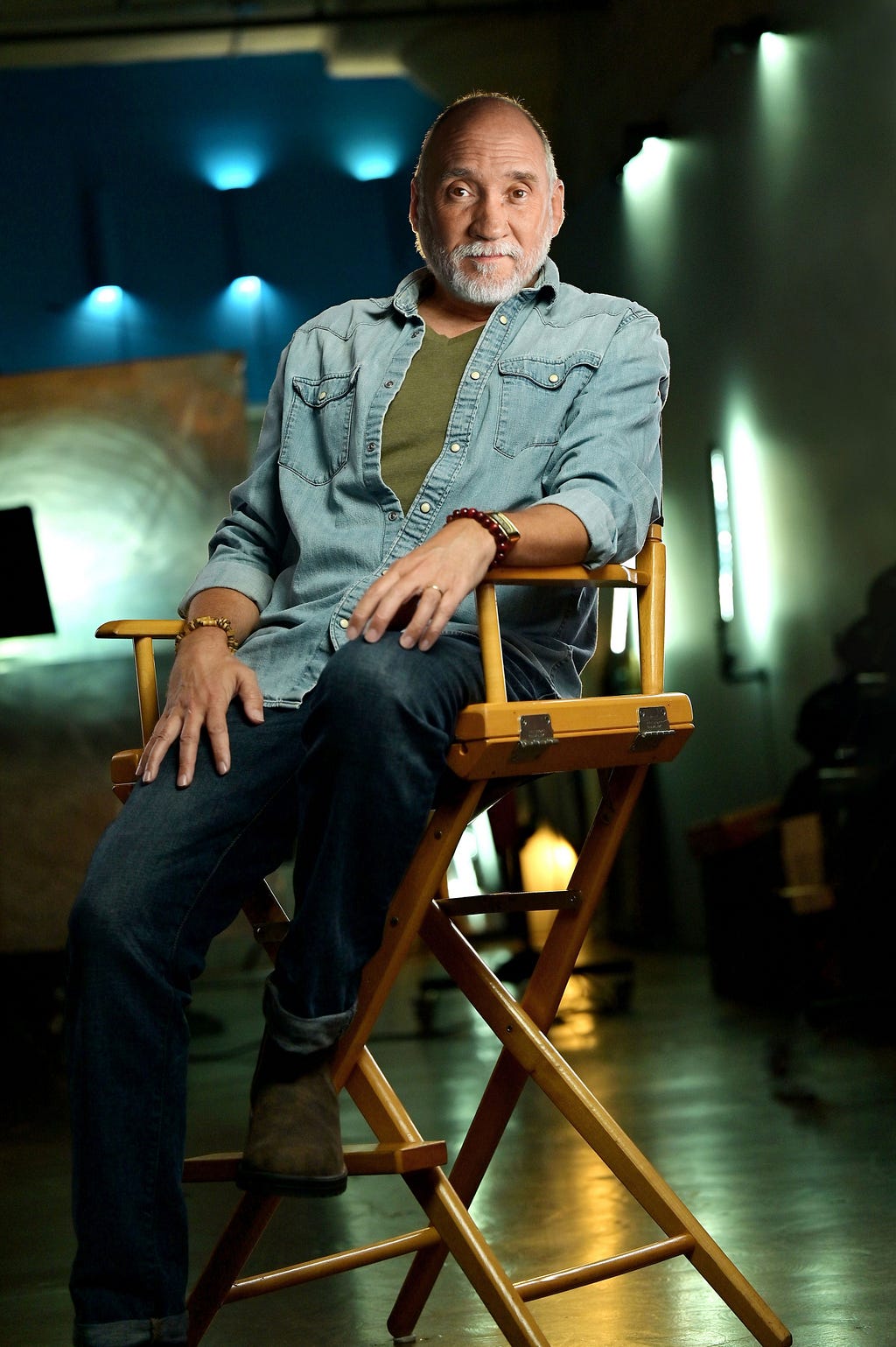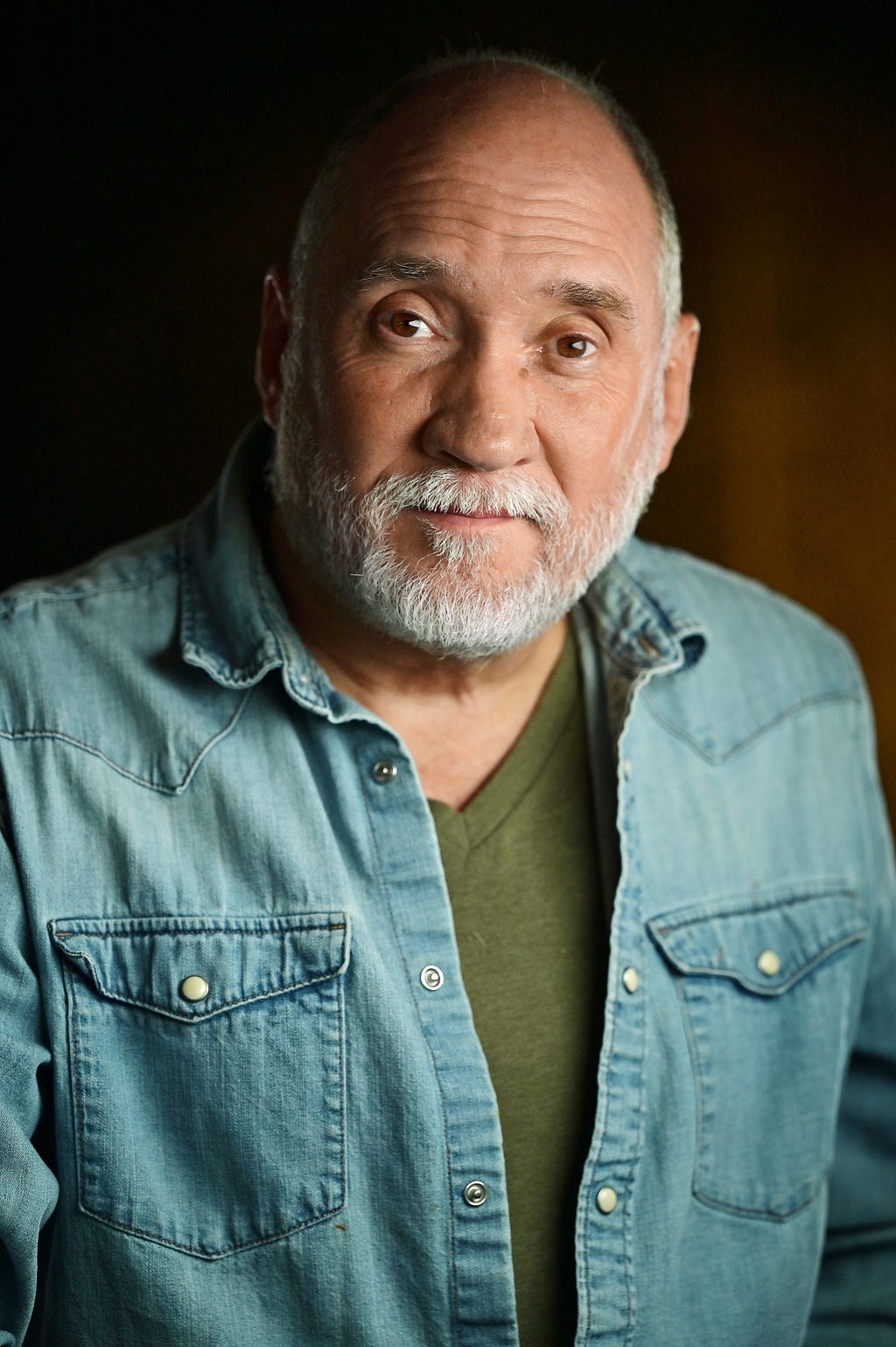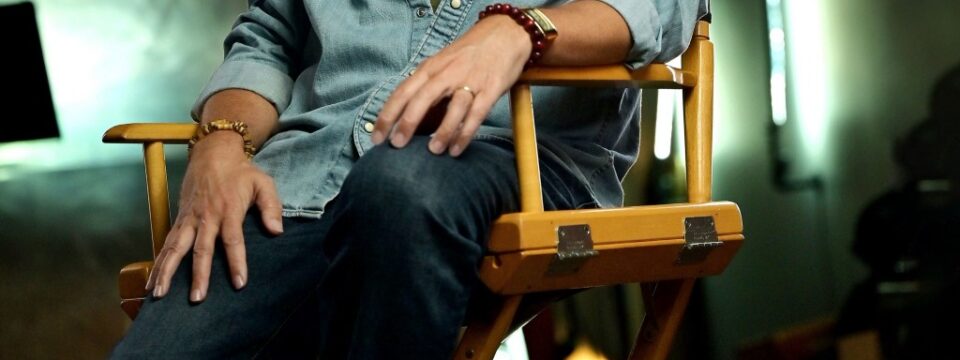Filmmakers Making A Social Impact: Why & How Filmmaker Cullen Douglas Is Helping To Change Our World

Don’t burn bridges. But if you do burn a bridge, bring lots of lighter fluid and dance around the fire.
As a part of our series about “Filmmakers Making A Social Impact” I had the pleasure of interviewing Cullen Douglas.
Cullen Douglas holds the distinction of being the first recipient of the Humanitas Prize’s “New Voices Fellowship.” His feature documentary, Billy Flanigan: The Happiest Man on Earth, has been lauded by critics and audiences alike for its feel-good message of hope, acceptance, and love. He previously wrote and directed the narrative short films, Fading Scars, set against 9/11, and Portrait of a Woman at Dawn, a #MeToo-inspired story set in 1920’s Paris. The latter film screened at over 50 international festivals and took top prizes in all categories, including Best Short Film and Best Director. Directing aside, Cullen is perhaps most recognized as an actor, having most recently recurred on HBO’s Barry. Fan-favorite appearances include roles on Marvel’s Agents of S.H.I.E.L.D, Pure Genius, Scandal, True Blood, Prison Break, Deadwood, Twin Peaks: The Return, Grey’s Anatomy, and Steven Spielberg’s anthology series Amazing Stories for AppleTV+.
Thank you so much for doing this interview with us! Before we dive in, our readers would love to get to know you a bit. Can you share your “backstory” that brought you to this career?
When I was four, I asked Santa for a tuxedo to wear to the Emmys. Santa delivered the tux — I’ve yet to attend the Emmys, but I’m ready when they call — although the suit will need some altering. I grew up all over the United States. My father was a journalist, at times an undercover investigative journalist, so we moved wherever the story was. This meant I was always the new kid in school, which was no fun at all. But I found my people and solace in television and film. Marcia and the rest of the Brady kids were my imaginary friends, as were Sigmund and the Sea Monsters, Willy Wonka, and Charlie Bucket. I escaped into TV. It’s also where I began to learn about storytelling. I did all the school plays, community theatre and then attended the American Musical and Dramatic Academy and Florida School of the Arts. From there, I toured the country with various bus & truck tours, playing large Broadway-size houses, and I think probably every cafetorium in America. Okay, fun fact — I’ve had the honor of performing in 49 of the 50 states. Tom McCarthy, I’m talking to you — would love to come visit ABC’s Alaska Daily.
I transitioned into film and television in my 30’s. Along the way, I met and fell in love with my wife, and we have two sons — who are now men in their 20’s. I came to writing and directing as a way to continue to tell stories when I wasn’t being asked to act in front of a camera or on a stage. All the films I’ve written and directed to date, and all the projects I’m currently working on, share a common thread… I try to examine the human condition in thought-provoking, and I hope, maybe even in inspiring ways. I’m not trying to sound deeper than I am. I basically just try and start a conversation with my films.
It has been said that our mistakes can be our greatest teachers. Can you share a story about the funniest mistake you made when you were first starting? Can you tell us what lesson you learned from that?
Great question — two funny early mistakes that happened on the same day immediately come to mind. I was fifteen years old and was auditioning for a community theatre production; they had asked us all to prepare a song and two contrasting monologues, as well as to be ready to dance if we got called back. For my classical monologue, I chose a piece from The Cherry Orchard, except I picked a speech given by Fiers — that character, I now know, is in his 80’s and senile. Despite my misstep, I was asked to stay for the dance portion of the audition. It was then that I learned a “dance belt” is not a belt to help keep your pants up. A dance belt is, in fact, similar to a jockstrap. I did not wear a dance belt that day… The lessons learned in retrospect are always read the play and always have support.
Who are some of the most interesting people you have interacted with? What was that like? Do you have any stories?
I have been incredibly fortunate to meet and work with so many amazing individuals, some of whom inspired me to get into the business in the first place. At the top of the list is Jeff Perry. Besides having played Cyrus Beene on ABC’s Scandal, Jeff is one of the co-founders of the venerable Steppenwolf Theatre in Chicago. Growing up, I was so influenced by the work Jeff and his fellow ensemble members were doing — they changed the face of American Theatre. Jeff is now a dear friend. Likewise, I’m enamored by Director Tom Verica, who now serves as an EP and Director on Bridgerton. Tom is an amazing storyteller. He and I first met when he directed me on an episode of Grey’s Anatomy. Jeff, Tom, my producing partner, Randy Goodwin, and I are actually developing a narrative feature called Plate River that looks at gun violence from the eyes of those left behind. This is a tough question. So many people have impacted me as an artist and human — Shonda Rhimes, whom I’ve worked for a number of times — and Casting Director Linda Lowy; they changed the trajectory of my career. Tom Hanks — he gave me my SAG card on his mini-series, From the Earth to the Moon. Maureen McCormick, not only was she Marcia Brady, who, as I mentioned, was an imaginary friend, but Maureen is now a real friend, and the work that she does for the inclusion of all people, regardless of ability, is a huge source of motivation for me. I’ve also recently been influenced by novelist Allison Larkin — Her storytelling is unmatched. My wife, Rachel, is incredibly interesting and has put up with my nonsense for almost thirty years. Seriously, this list could go on and on…
Which people in history inspire you the most? Why?
I’ve always been drawn to people who are champions for the marginalized. People who help give voice to those who have been oppressed or pushed aside. I’m inspired by the lives and work of people like Eunice Kennedy Shriver and Martin Luther King Jr. On a smaller scale, what Alan Alda and the creators of the television series M*A*S*H did was just extraordinary. The show explored not only the theme of war but also tackled gay themes, racism, sexism, ageism, the equal rights movement, mental health issues, and so on… And they did it all with grace, class, and often humor. That show influenced and inspired me immeasurably.
Let’s now shift to the main focus of our interview, how are you using your success to bring goodness to the world? Can you share with us the meaningful or exciting social impact causes you are working on right now?
Success is a tricky word — it’s in the eye of the beholder. I’m a working journeyman actor who also tells stories by writing and directing. As I mentioned earlier, the stories I like to tell examine the human condition with the hope of finding commonality. My current film, Billy Flanigan: The Happiest Man on Earth, hopes to do just that. We all have stories. It’s a matter of shining a light on those stories to create the space for connection. I firmly believe the most important moment of a film is the car ride home, when we share what we’ve collectively just witnessed and digested. As I said, it’s about starting a conversation. If I can do that, I’m not only doing my job as a filmmaker; I would like to think I’m also doing my job as a father and, ultimately, as a human. We live in a very divided world — the haves and have-nots, the right and the left, the powerful and the voiceless. I have two sons. I want to live in a world or help create a world where both of them can be whoever they want to be and love whoever they want to love. My oldest son was born with an ID (an intellectual disability), Down syndrome. He deserves the same rights and privileges my typical son is afforded. Filmmaking allows us to step inside someone else’s shoes. It allows us to view their world not with sympathy but with empathy. At the end of the day, in my humble, if we all could recognize that we’re more alike than we are different, we could get through this thing called life a little easier.
Many of us have ideas, dreams, and passions, but never manifest it. But you did. Was there an “Aha Moment” that made you decide that you were actually going to step up and take action for this cause? What was that final trigger?
I started making Billy Flanigan: The Happiest Man on Earth during the early days of the pandemic. I needed a creative outlet because the industry was shut down. But I needed to keep telling stories — somehow. I make films first and foremost to entertain. I wouldn’t say I necessarily have a cause or an agenda as a filmmaker. My first film, Fading Scars, was about a young couple falling in love, set against the aftermath of 9/11. It looked at the need to talk openly about mental health. There shouldn’t be shame. My film, Portrait of a Woman at Dawn was inspired by the #MeToo movement — and showed how far we’ve come and how far we still need to go to create true equality. Billy Flanigan: The Happiest Man on Earth is about a single act of kindness and how it can change someone’s day and even their DNA. It also delves into finding your true self. I don’t make films as clickbait or to sensationalize a movement or a cause. I simply try to put an audience into my protagonist’s shoes. How they receive it is up to them. The one-man play I wrote following the birth of my oldest son was about me learning to get out of my own way. I had to expose some not-so-pleasant things about my own character, but in doing so, my hope was that others could perhaps see themselves in my struggles and triumphs. Which, in turn, could start a conversation about acceptance for all, regardless of ability. Again, I’m not that deep — I’m pretty transparent. My favorite color is clear. Kidding…
Can you tell us a story about a particular individual who was impacted or helped by your cause?
This question assumes someone was actually impacted by one of my films. I’m not sure if that’s the case. But I can share that Billy Flanigan called me after watching the rough cut of the film with his family and ex-wife, and he said, “This film is healing my family — it’s happening right now in front of me.” By putting their story on screen, it gave them the distance they needed to heal. I mean, come on, from that point forward, any critical acclaim the film might get pales in comparison to that phone call. Everything is now just icing on the cake.
Are there three things that individuals, society or the government can do to support you in this effort?
It’s about relationships, talk, share, connect. We’re more alike than we are different. Again, as a storyteller, I’ve tried to bring light to several issues — but on a very personal note, the need for continued funding of programs brought about by the ADA is really important to me — The Americans with Disabilities Act is one of the most comprehensive pieces of civil rights legislation that prohibits discrimination and guarantees that people with disabilities have the same opportunities as everyone else.
What are your “5 things I wish someone told me when I first started” and why. Please share a story or example for each.
- Don’t be afraid to say no — There is great power in the word “no.”
- Don’t burn bridges. But if you do burn a bridge, bring lots of lighter fluid and dance around the fire.
- Keep a sense of humor. Rule no# 1 — Keep a sense of humor. Rule no# 2 — Don’t forget Rule no# 1.
- It’s all about relationships. Find your people and keep them close.
- Read the play.
If you could tell other young people one thing about why they should consider making a positive impact on our environment or society, like you, what would you tell them?
Tell stories that mean something to you, that are important to you — the rest will take care of itself.

We are very blessed that many other Social Impact Heroes read this column. Is there a person in the world, or in the US, whom you would like to collaborate with, and why? He or she might see this. 🙂
I’m always open to collaboration — especially with folks who can teach me something new about the world and about myself. I would love to do a western — as an actor, writer, or director. If your strip away the normal tropes, a western, at its core, is about hope for a better tomorrow. I would also love to do a play — the last time I was on stage was in 2016 when I did Who’s Afraid of Virginia Woolf? I want to get back on the boards. I’d also love to go to Alaska to check it off the list. Tom McCarthy, are you reading this…? Yes, I know they film mostly in Vancouver. I open.
Can you please give us your favorite “Life Lesson Quote”? Can you share how that was relevant to you in your life?
I have a few quotes that I keep in heavy rotation in my life, but if I had to pick just one, it would have to be –
“If someone says you’re too something, listen intently; that’s probably the key to your success…” I can’t tell you how many times that has proven true in both my career and personal life. I was told for years growing up that I was too sensitive; I felt things too deeply. I would like to think that sensitivity helps me be a better storyteller. There’s a difference between being sympathetic and empathetic.
How can our readers follow you online?
I’m on Instagram at @realcullendouglas — Just remember the Golden Rule of social media, “Tweet others the way you want to be tweeted.” — Sorry. Dad joke. I’ll let myself out…
This was great, thank you so much for sharing your story and doing this with us. We wish you continued success!
Photo Credits Color Photos by Tim Coto
BW Photos by Shane Liem
Filmmakers Making A Social Impact: Why & How Filmmaker Cullen Douglas Is Helping To Change Our… was originally published in Authority Magazine on Medium, where people are continuing the conversation by highlighting and responding to this story.
